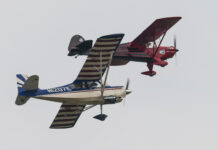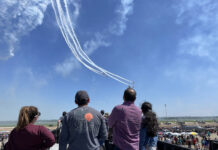By the end of the 2007 season, the air show community had suffered through six fatal accidents at air shows…more than in any year since 2000 and twice as many as an “average” year. Throughout the industry, on phone calls, in e-mails and during conversations at air shows, a consensus was developing that the very survival of the air show business might be at stake.
“We’ve got to do something,” air show professionals have been saying to one another. “We can’t just sit back and let this continue.”
“As far as I’m concerned, it’s pretty simple,” says ICAS member and veteran air show performer Steve Oliver. “Performers have to quit killing themselves. I don’t know how to teach survival instinct or good judgment. We keep discussing how to keep the new person safe, but if you look at the record, it’s often the person with experience that hits the ground.”
Air show pilot Sean Tucker does not mince words when addressing fellow performers. He’s in his twentieth year as an ICAS member, twenty-sixth year as a performer, and sixteenth year making a living as a sponsored performer. He has personally witnessed at least 15 pilots die at air shows.
“Jimmy [Franklin] and Bobby [Younkin] were our air show heroes. They were held in such high regard. So it was a wake-up call when they died [in 2005],” says Tucker. “These were the most talented performers in the industry, but as operating costs increased, performer fees could no longer support their expenses. They were determined to prove they could make it in this industry on their own, by being the most exciting performers in the sky.
“Jim LeRoy carried that torch when they were killed. So, when he died last year, everybody finally said, ‘Stop the music! Something’s gotta change here.’”
Undeniably, most agree that performers themselves are most immediately responsible for air show safety. Whatever else may be going on at a show, personal survival has a way of motivating the average human toward self-preservation. But the ICAS initiative to change the culture of air show safety presumes that that the industry’s entire safety culture should change, not just the pilots’. So, what role do event organizers, air bosses and other individuals play in promoting and preserving air show safety?
Tucker believes that air show event organizers should share some of that responsibility. “You’ll hear people say they saw it coming; they knew it was just a matter of time before this or that pilot whose margins are so narrow, if he slips just a little, he’s probably going to die. Yet those same people hire that guy to fly their show. Who takes ownership of the aftermath?”
Rick Grissom is president of GM Productions and Aerial Entertainment Resources, which provide air show production and promotion, consulting, sound and air operation services. He believes responsibility for safety “…starts and ends with the air show organizer, who has the authority to hire or not in the first place. The price of an act should play no part in who to hire. No pilot who pushes too hard to impress by pushing their limits of safety and capability should be hired. You can entertain without putting yourself – or anyone else – at risk.”
Grissom won’t sign a contract unless he first secures the right to deny a pilot the right to fly due to safety issues. “I’ve refused many ‘free’ performers and have had to be the bad guy. But it’s really been for their own good. The ‘free’ act should be just as good as the $10,000 act, and visa versa. The pilot must be safe and qualified… period.”
Dan Biggs, organizer of Cleveland’s National Air Show, helped develop the Air Shows 101 Air/Ground Operations Training Seminar that ICAS conducts at its annual convention. He also assisted in rewriting the ICAS Operations Manual and other ICAS Safety Guidelines. He says, “Pilots must understand the difference between good entertainment and marginal showmanship, plus know and respect their own limitations. Organizers that hire the non-professional air bosses or appoint an air traffic controller who is not experienced or current with air show productions are doing both the performer and the public an injustice and definitely jeopardize safety at air shows.”
Organizers have also been called upon to do a better job of meeting performers’ expected needs up front, so pilots won’t have to chase after them during the show. Basic creature comforts – like food, water, port-o-lets, and a spot of cool privacy apart from the crowd – should be provided in the performers’ area. A performer shouldn’t have to fight for their room, smoke oil, fuel, car or other basics. And when these requirements are not taken care of, it’s more than an inconvenience. It can become a safety issue.
Skywriter Suzanne Asbury-Oliver points out that air show personnel sometimes don’t understand that the few things performers request are vitally important. “We need our cars on the flight line for numerous reasons, like being able to get out of the sun to cool off, or to shuttle back and forth with needed things.
“In one high-profile fatal accident, the air show made decisions regarding the pilot’s standard request (not allowing performers’ cars on the flight line), which created real problems for this performer. It was reported by another performer that the person involved in the accident had been so upset, he had stated, ‘Let’s just get this flight over with and get out of here!’ We, as performers, need to be able to concentrate on what we’re doing and not have problems to deal with. Basically, if we ask for something, it’s because it’s needed. If it’s a certain type of smoke oil, for example, there’s a good reason.”
Aerobatic performer John Klatt says organizers and performers need to meet together to accomplish shared goals. When pilots’ necessities aren’t met, they can’t perform optimally. A performer won’t be able to do his best if he has to fuel his own plane and push it onto the line-up ramp himself. “A pilot needs a good half-hour to just sit and think calmly before flying. Otherwise, mishaps are more likely to happen,” Klatt says.
As those responsible for everything in front of (and above) the crowd line, air bosses share in the responsibility for maintaining safety at an air show. “I’m putting the pressure on the air bosses,” says Tucker. “Especially the local FBO guys who are doing the best they can, but are putting everyone’s safety at risk due to their ignorance.”
George Cline of AirBoss, Inc. is a retired air traffic controller, ICAS seminar instructor and air show controller for both Sun ‘n Fun and AirVenture, among others. He agrees that some air bosses, “…are amateurs who don’t know what they’re doing. They have limited experience. They don’t have the tools for the job. You need to be able to watch the crowd as much as the aircraft, managing a safe, orderly and expeditious flow of traffic. But some shows don’t want to hire a professional air boss because it’s cheaper to use Joe Blow from the FBO.”
An air boss needs wisdom and diplomacy to prohibit a pilot from performing if he proves to be unsafe during practice. “Sometimes pilots – especially some warbird guys – don’t have all the experience they need, so I either ask them to stand down or I put them out of the way so they can’t hurt anybody,” Cline says. “I don’t want performers straying outside the box. I call them on it. I make sure they hear from me if I see anything unsafe. Usually, we’re able to work out the bugs on practice days, so when the show starts up, everything’s hunky-dory. I’m here to enforce the rules, but an air boss can do only so much. I cannot fly the airplane for the pilot. He must go by my rules.”
Also, air bosses must re-examine the way briefings are conducted. “The industry needs to read the definition of ‘brief,’” Grissom says. “They need to be informative, instructional and short. Humor is fine, but save presenting awards and goofing off in a carnival atmosphere for dinners and parties after the show.”
Biggs adds that family members, friends and pets should not attend briefings… only pilots and essential personnel.
Many performers suggest that briefings be held closer to show time, rather than at 7 a.m., since the early wake-up deprives performers of needed sleep, then they spend long hours in the heat on the tarmac, which weakens their ability to provide their best possible performance.
Air boss Wayne Boggs, who has worked for the FAA for 30 years, says you can’t always trace the cause of an accident. “Accidents are the result of an accumulation of little unchecked oversights or mistakes that ultimately lead to the crash. It’s complex. There are no easy answers that pinpoint the cause.”
Point well made, but not necessarily the end of discussion. “It is a dangerous business,” Tucker agrees. But there are self-correcting methods that mitigate the danger. “If you don’t build a safety margin into your routine, you’re sure to die doing it. There will always be pilots willing to push those safety margins. Their disdain and arrogance put the industry at risk. The pros should not allow these new guys to fly stupid.”
It takes one to know one. Tucker admits he used to be one of those ‘bad boys’ when he was first breaking into the industry. “I pushed the envelope. I would do anything to make it in this business. I thought it was a risk worth taking – and even dying for.”
“As performers, we all need to take a look at how we operate,” says Klatt. “It needs to start with me. I need to make sure I operate as safely as possible. I welcome constructive criticism. If I’m flying on the edge of the envelope, I want my peers to tell me so I can make the necessary adjustments that will keep me alive longer.”
Grissom, Biggs and Cline offer specific advice to performers committed to avoiding air show accidents:
- Practice more, not less.
- Never change from your standard routine during a performance.
- Make sure you’re mentally fit, physically fit and clear-minded. Don’t fly if you’re sick!
- Never attempt to fly with someone else without a practiced script.
- Don’t overestimate your capabilities or overfly your skills.
- Plan an ‘out’ for every maneuver in the event of an unexpected problem. Otherwise, you’re an accident waiting to happen, endangering yourself and the industry as a whole.
Prioritizing safety should be a collective natural instinct that can only strengthen the industry. “It’s the nature of a performer to worry about safety,” says Boggs. “That’s also the number one priority of the air boss. It all falls on the air show organizer, whose responsibility it is to prove they operate safely. Their show’s future is on the line, and it’s severely threatened with any accident. So it’s in all our best interest to do everything humanly possible to avoid these accidents.”
Klatt adds, “As a community, we need to be more proactive and take corrective action to address unsafe issues on the ground and in the air. This can be a positive culture change. If everyone works together in a cooperative atmosphere where every voice is heard and valued, we can hit that target of a lower incident rate.”
Otherwise, the industry loses its luster in the eyes of supporting sponsors, among industry peers and the public. As Tucker puts it… “When somebody dies at an air show, there’s a collective gasp, the day is ruined, and kids’ dreams are ruined forever. Nothing can recoup that. It’s very graphic. It’s all over the media. It causes ruin throughout the industry.”
Instead, each air show professional must respect their role as a privilege and exercise tough love with peers who may not be operating safely. If everyone pursues their dream for the right reasons, as Tucker says, “it evokes intoxicating emotions when we get to go (or observe) dancing in the sky. Dying in the process is unacceptable. We players who remain have to cherish this privilege to realize a huge future in this business.”
To inspire and hold the crowd’s attention without risking life and limb is all within reach.








